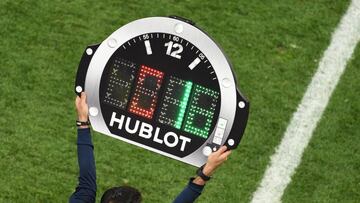App to give fans smartphone vote on player substitutions?
A Premier League club allegedly wants to let supporters vote via their mobiles for the player they want to be taken off in a match.

An English Premier League club wants to allow supporters to vote via smartphone for the player they want substituted during a match, a data analyst has told a Doha football conference.
Fans would cast their votes via an app on their phones after being given real-time performance data for every player on the pitch, said Mark Sear, chief technology officer with data and analytics company EMC.
The leading club, which cannot be named, wants to introduce the interactive innovation for fans in order to boost attendances at Under-21 matches.
If the club gets permission from the English Football Association, the scheme could be brought in from as early as next season.
"The club is considering allowing fans to vote on substitutions," said Sear.
"They are asking for permission to free up data for the crowd. They get small crowds for Under-21 games but they think they can get up to 10,000 fans for such games."
The data the fans will look at will be gathered from 'wearable' technology.

In this case that will be a high-tech armband which can measure performance as well as such things as heart rate, respiratory rate and blood pressure.
A spokeswoman for the FA said that at the beginning of the current season "the Premier League permitted clubs to use EPTS (Electronic Performance Tracking Systems) devices provided they are approved by the League".
The wearables in the proposal for voting on substitutes are used by players in training but are, for now, not allowed to be used in competitive matches, Sear told AFP on the fringes of the World Stadium Congress conference in Doha.
However, that will not stop clubs from lobbying for further change, he declared.
Under this proposal, the information the fans will be able to see will be the same as that viewed by the club's coach via a tablet.
But despite the public vote, the coach will still be able to ignore the fan's wishes and substitute which player he wants.
"It actually makes it very similar to Championship Manager (football management computer game) because you judge people off their numbers," he said. "It makes it a fascinating experience."
Mark Sears presenting on how EMC help transforming Stadiums into #smart ones #worldstadiumcongress @EMCMiddleEast pic.twitter.com/ZZkLeB40Au
— Habib Mahakian (@HMahakian) May 17, 2016
Two other clubs are thought to have approached the FA seeking permission for using wearables during first-team matches, said Sear.
The potentially ground-breaking scheme not only demonstrates the increasing power of analytics in professional sport, but also football's changing relationship with its fans, said Sear.
He said at least 70 per cent of football fans use their smartphone while in a stadium watching a game.
Turning up just to watch a match is no longer what the modern-day fan wants, but they also want to interact, he said.
At the moment that is via social media platforms such as Twitter. But technology may take that interaction a step further.
Related stories
If the scheme gets the green light, in the future it could allow fans to see heart rates of players about to take a penalty, said Sear.
It could even be used by supporters to see the analytics for players who have just been sent off.